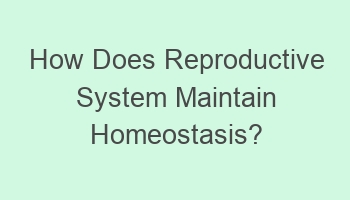How Does Reproductive System Maintain Homeostasis?

How Does Reproductive System Maintain Homeostasis? The reproductive system maintains homeostasis by regulating hormone levels. Homeostasis is crucial for overall health. The reproductive system plays a vital role in maintaining balance. It ensures proper hormone production and distribution. By regulating estrogen and testosterone levels, it promotes stability. This process is essential for reproduction and overall well-being. Proper functioning of the reproductive system is key to maintaining homeostasis. Imbalances can lead to various health issues. Understanding how the reproductive system maintains homeostasis is crucial for optimal health.
Contents
| The reproductive system maintains homeostasis through hormonal regulation. |
| Feedback mechanisms help regulate the reproductive system to maintain balance. |
| Gonads produce hormones that play a key role in maintaining homeostasis. |
| Sperm and egg production are carefully regulated to ensure balance. |
| The reproductive system works in coordination with other systems to maintain homeostasis. |
- Hormones like estrogen and testosterone help regulate the reproductive system.
- Menstrual cycles in females are part of the homeostatic regulation process.
- Proper nutrient intake is essential for maintaining reproductive system balance.
- Stress can impact the reproductive system’s ability to maintain homeostasis.
- Regular exercise can help support the reproductive system in maintaining balance.
Why is Homeostasis Important for the Reproductive System?
Homeostasis is crucial for the reproductive system as it ensures that optimal conditions are maintained for reproduction to occur efficiently. Without proper homeostasis, various physiological processes necessary for reproduction may be disrupted, leading to infertility or other reproductive disorders.
- It regulates hormone levels essential for reproductive function.
- It maintains the right temperature for sperm and egg production.
- It ensures proper pH levels for sperm survival and motility.
What Role Does Hormonal Balance Play in Reproductive Homeostasis?
Proper hormonal balance is crucial for maintaining reproductive homeostasis. Hormones such as estrogen, progesterone, and testosterone play key roles in regulating ovulation, menstruation, and sperm production, respectively.
| Estrogen | Regulates menstrual cycle and prepares the uterus for pregnancy. |
| Progesterone | Supports embryo implantation and maintains pregnancy. |
How Does the Reproductive System Maintain Sperm Viability?
The reproductive system maintains sperm viability through various mechanisms. One crucial aspect is the regulation of temperature, as sperm production requires a slightly lower temperature than the body’s core temperature.
- Proper blood flow to the testes helps maintain the ideal temperature for sperm production.
- Secretions from the prostate and seminal vesicles provide nutrients and support for sperm survival.
What Role Does Ovulation Play in Reproductive Homeostasis?
Ovulation is a key process in reproductive homeostasis for females. It involves the release of a mature egg from the ovary, which is necessary for fertilization to occur.
| Ovulation | Ensures the availability of a viable egg for fertilization. |
How Does the Reproductive System Adapt to Pregnancy?
The reproductive system undergoes significant adaptations during pregnancy to support the growing fetus and ensure a successful pregnancy. Hormonal changes, increased blood flow, and changes in the uterus are some of the key adaptations.
- Increased production of hormones like estrogen and progesterone supports pregnancy.
- The uterus expands to accommodate the growing fetus.
What Impact Does Stress Have on Reproductive Homeostasis?
Stress can have a significant impact on reproductive homeostasis by disrupting hormonal balance and affecting fertility. High levels of stress can lead to irregular menstrual cycles, infertility, or decreased libido.
| Stress | Affects hormone production and can interfere with ovulation. |
How Does the Reproductive System Respond to Aging?
The reproductive system undergoes changes as individuals age, impacting reproductive homeostasis. For females, menopause marks the end of reproductive capacity, while males may experience a decline in sperm quality with age.
- Menopause results in the cessation of menstruation and ovulation.
- Sperm quality may decline due to age-related changes in the testes.
What Role Does Nutrition Play in Reproductive Homeostasis?
Nutrition plays a crucial role in maintaining reproductive homeostasis by providing essential nutrients for reproductive function. Certain vitamins, minerals, and antioxidants are important for fertility and overall reproductive health.
| Vitamins | Support reproductive hormone production and function. |
| Antioxidants | Protect sperm and eggs from oxidative damage. |
How Does Exercise Impact Reproductive Homeostasis?
Exercise can have both positive and negative impacts on reproductive homeostasis. Moderate exercise is beneficial for reproductive health, while excessive or intense exercise can disrupt hormonal balance and affect fertility.
- Moderate exercise can help improve blood flow to reproductive organs.
- Excessive exercise may lead to irregular menstrual cycles in females.